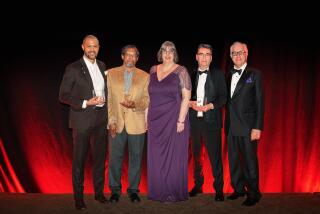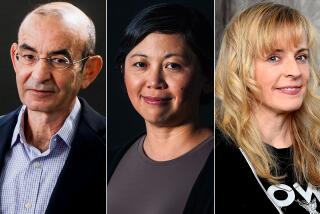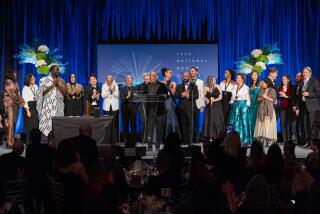A reader’s guide to Wednesday’s National Book Awards
For 20 American writers, the moment of truth is almost here. The winners of the National Book Awards will be announced Wednesday evening at a ceremony in New York.
The awards, given in four categories (fiction, nonfiction, poetry and young people’s literature) are among the most prestigious in American literature, and the winner in each category receives a prize of $10,000.
This is the second year the National Book Awards has used longlists. Ten books in each category were selected in September, and those lists were winnowed down to shortlists of five finalists in October. The new process hasn’t been universally popular. Los Angeles Times book critic David L. Ulin thinks the change has made the release of the finalists “anticlimactic” and worries that it could dilute the attention given to the authors: “[I]t’s hard to stir interest in the same subject twice, which is what the National Book Award is trying to do.”
The National Book Awards have been known for sometimes radical changes in process, however. At the Melville House blog, editor Mark Krotov notes that the prizes have been reinvented more than once: “In 1980, the National Book Awards were replaced by The American Book Awards, which promised to bring the prizes to the masses. At the rebranded awards’ first ceremony (co-hosted by William F. Buckley), thirty-four prizes were given out in twenty-one categories.”
Compared to the 1980 iteration, which quickly turned into a notorious fiasco, this year’s awards are likely to be much more stripped-down and sedate. The ceremony will be live-streamed tomorrow at the National Book Foundation’s website, starting at 4:40 p.m. PT. Daniel Handler, the author best known for writing children’s books under the name Lemony Snicket, will host.
The finalists for this year’s awards are below.
Fiction:
Rabih Alameddine, “An Unnecessary Woman” (Grove Press/ Grove/Atlantic)
Anthony Doerr, “All the Light We Cannot See” (Scribner/ Simon & Schuster)
Phil Klay, “Redeployment” (The Penguin Press/ Penguin Group)
Emily St. John Mandel, “Station Eleven” (Alfred A. Knopf/ Random House)
Marilynne Robinson, “Lila” (Farrar, Straus & Giroux)
Nonfiction:
Roz Chast, “Can’t We Talk About Something More Pleasant?” (Bloomsbury)
Anand Gopal, “No Good Men Among the Living: America, the Taliban, and the War Through Afghan Eyes” (Metropolitan Books/Henry Holt and Co.)
John Lahr, “Tennessee Williams: Mad Pilgrimage of the Flesh” (W.W. Norton & Co.)
Evan Osnos, “Age of Ambition: Chasing Fortune, Truth, and Faith in the New China” (Farrar, Straus & Giroux)
Edward O. Wilson, “The Meaning of Human Existence” (Liveright Publishing Corp./ W.W. Norton & Co.)
Poetry:
Louise Glück, “Faithful and Virtuous Night” (Farrar, Straus & Giroux)
Fanny Howe, “Second Childhood” (Graywolf Press)
Maureen N. McLane, “This Blue” (Farrar, Straus & Giroux)
Fred Moten, “The Feel Trio” (Letter Machine Editions)
Claudia Rankine, “Citizen: An American Lyric” (Graywolf Press)
Young adult literature:
Eliot Schrefer, “Threatened” (Scholastic Press/Scholastic)
Steve Sheinkin, “The Port Chicago 50: Disaster, Mutiny, and the Fight for Civil Rights” (Roaring Brook Press/Macmillan Publishers)
John Corey Whaley, “Noggin” (Atheneum Books for Young Readers/Simon & Schuster)
Deborah Wiles, “Revolution: The Sixties Trilogy, Book Two” (Scholastic Press/Scholastic)
Jacqueline Woodson, “Brown Girl Dreaming” (Nancy Paulsen Books/Penguin Group)
More to Read
Sign up for our Book Club newsletter
Get the latest news, events and more from the Los Angeles Times Book Club, and help us get L.A. reading and talking.
You may occasionally receive promotional content from the Los Angeles Times.






